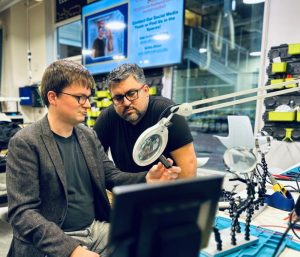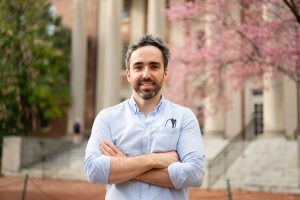
Nicolas Pégard and Pedro Sáenz, faculty members in the College of Arts and Sciences, have been awarded 2023 Sloan Research Fellowships, among the most prestigious awards given to early-career scientists.
Pégard is an assistant professor in the department of applied physical sciences, and Sáenz is an assistant professor in the department of mathematics.
The announcement was made by the Alfred P. Sloan Foundation on Feb. 15. A total of 126 early-career researchers were awarded the fellowships, given to extraordinary U.S. and Canadian scientists whose creativity, innovation and research accomplishments make them stand out as the next generation of leaders. The new fellows, who were nominated by their peers, are drawn from a diverse range of 54 institutions across seven academic fields. Winners receive a two-year, $75,000 fellowship which can be used to advance their research.
“Sloan Research Fellows are shining examples of innovative and impactful research,” said Adam F. Falk, president of the Alfred P. Sloan Foundation. “We are thrilled to support their groundbreaking work.”
Pégard’s research is at the intersection of neuroscience, optical engineering and computer science. His lab tackles neuroscience research questions with custom-designed optical technology.
“We observed that many of our neuroscientist colleagues were unable to pursue their dream experiments due to lack of adequate technology, so we created a lab to develop custom optical instruments that are tailored to their exact experimental needs beyond what is commercially available,” Pégard said.
Pégard will use the Sloan fellowship to develop a new technology called biometric ocular photometers in collaboration with the lab of assistant professor Jose Rodríguez-Romaguera in the UNC department of psychiatry. The technology uses infrared light diffusing from the back of the eye to track eye movement, pupil size, breathing rate and heart rate.

Pégard earned a Ph.D. in computational imaging at Princeton University and joined the UNC faculty in 2019. He is the recipient of a Beckman Young Investigator Award, a Career Award at the Scientific Interface from the Burroughs Wellcome Fund and a Kavli Foundation Innovation Award.
Sáenz’s research is also interdisciplinary, lying at the intersection of mathematics and fundamental physics. His work focuses on the mathematical description of nonlinear fluid processes to reveal surprising connections between classical mechanics, which describes the familiar behavior of large objects, and quantum mechanics, which describes the strange behavior of tiny particles such as electrons. His recent research has demonstrated that oil droplets walking on the surface of a vibrating liquid may behave like sub-atomic particles in a number of settings, revealing particle-wave dual effects previously thought exclusive to the quantum world.
“In our lab, we combine theory, simulations and experiments to better understand fundamental problems in physics and engineering,” Sáenz said. “We work to demonstrate that odd behaviors displayed by electrons and other atomic-sized particles can be recreated with larger particles visible to the human eye that move guided by the waves they excite.”
Sáenz earned a Ph.D. from the University of Edinburgh. He pursued postdoctoral work at the Massachusetts Institute of Technology where he taught applied mathematics. He joined the UNC faculty in 2019. Sáenz is the recipient of a National Science Foundation Early Career Development Award and recently won the American Physical Society’s Van Dyke Gallery of Fluid Motion Award.
Awarded annually since 1955, a Sloan Fellowship is among the most coveted awards given to young researchers in part because many past fellows have gone on to great achievements in science. Fifty-six fellows have received a Nobel Prize in their respective field. Potential fellows are nominated by their peers and then selected by an independent panel of senior scholars.
Learn more about the 2023 Sloan Fellows.
